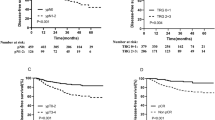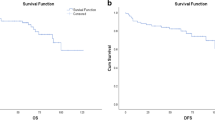Abstract
Purpose
The prognostic significance of the depth of mesorectal invasion (DMI) in patients with ypT3 rectal cancer who undergo preoperative chemoradiotherapy (CRT) is unclear. The purpose of this study was to evaluate the prognostic significance of DMI in ypT3 rectal cancer.
Methods
A total of 168 (y)pT3 patients were evaluated, of whom 93 received preoperative CRT and 75 underwent surgery alone. Patients were subdivided into two groups according to the DMI (T3ab = DMI ≤5 mm and T3cd = DMI >5 mm). Oncologic outcomes were compared between the T3ab and T3cd groups and the ypT3ab and ypT3cd groups.
Results
Relapse-free survival was significantly different between the pT3ab and pT3cd groups (74.1 vs 38.5%, P = 0.0192) but not between the ypT3ab and ypT3cd groups (65.9 vs 61.5%, P = 0.513). Multivariate analysis showed that DMI was an independent predictor of recurrence in pT3 patients (hazard ratio [HR] = 2.980, 95% confidence interval [CI] 1.227–7.025; P = 0.0169) and that ypN+ was an independent predictor of recurrence in ypT3 patients (HR = 3.487, 95% CI 1.570–8.827; P = 0.0016).
Conclusions
DMI was not a significant predictive factor for recurrence in patients with ypT3 rectal cancer who underwent preoperative CRT, and ypN+ was the only independent predictive factor for recurrence.



Similar content being viewed by others
References
Merkel S, Mansmann U, Siassi M, Papadopoulos T, Hohenberger W, Hermanek P (2001) The prognostic inhomogeneity in pT3 rectal carcinomas. Int J Color Dis 16:298–304
Akagi Y, Shirouzu K, Fujita S, Ueno H, Takii Y, Komori K, Ito M, Sugihara K, Study Group of the Japanese Society for Cancer of the Colon and Rectum (JSCCR) on the Clinical Significance of the Mesorectal Extension of Rectal Cancer (2012) Predicting oncologic outcomes by stratifying mesorectal extension in patients with pT3 rectal cancer: a Japanese multi-institutional study. Int J Cancer 131:1220–1227
Miyoshi M, Ueno H, Hashiguchi Y, Mochizuki H, Talbot IC (2006) Extent of mesorectal tumor invasion as a prognostic factor after curative surgery for T3 rectal cancer patients. Ann Surg 243:492–498
Shirouzu K, Akagi Y, Fujita S, Ueno H, Takii Y, Komori K, Ito M, Sugihara K, Japanese Society for Cancer of the Colon and Rectum (JSCCR) on Clinical Significance of the Mesorectal Extension of Rectal Cancer (2011) Clinical significance of the mesorectal extension of rectal cancer: a Japanese multi-institutional study. Ann Surg 253:704–710
Glimelius B, Tiret E, Cervantes A, Arnold D, ESMO Gudelines Working Group (2013) Rectal cancer: ESMO clinical practice guidelines for diagnosis, treatment and follow-up. Ann Oncol 24(Suppl 6):vi81–vi88
Merkel S, Weber K, Schellerer V, Gohl J, Fietkau R, Agaimy A, Hohenberger W, Hermanek P (2014) Prognostic subdivision of ypT3 rectal tumours according to extension beyond the muscularis propria. Br J Surg 101:566–572
Shin R, Jeong SY, Yoo HY, Park KJ, Heo SC, Kang GH, Kim WH, Park JG (2012) Depth of mesorectal extension has prognostic significance in patients with T3 rectal cancer. Dis Colon Rectum 55:1220–1228
Bori R, Sejben I, Svebis M, Vajda K, Marko L, Pajkos G, Cserni G (2009) Heterogeneity of pT3 colorectal carcinomas according to the depth of invasion. Pathol Oncol Res 15:527–532
Taylor FG, Quirke P, Heald RJ, Moran B, Blomqvist L, Swift I, Sebag-Montefiore DJ, Tekkis P, Brown G, MERCURY study group (2011) Preoperative high-resolution magnetic resonance imaging can identify good prognosis stage I, II, and III rectal cancer best managed by surgery alone: a prospective, multicenter, European study. Ann Surg 253:711–719
Nagtegaal ID, Quirke P (2008) What is the role for the circumferential margin in the modern treatment of rectal cancer? J Clin Oncol 26:303–312
Gosens MJ, Klaassen RA, Tan-Go I, Rutten HJ, Martijn H, van den Brule AJ, Nieuwenhuijzen GA, van Krieken JH, Nagtegaal ID (2007) Circumferential margin involvement is the crucial prognostic factor after multimodality treatment in patients with locally advanced rectal carcinoma. Clin Cancer Res 13:6617–6623
Park JS, Huh JW, Park YA, Cho YB, Yun SH, Kim HC, Lee WY, Chun HK (2014) A circumferential resection margin of 1 mm is a negative prognostic factor in rectal cancer patients with and without neoadjuvant chemoradiotherapy. Dis Colon Rectum 57:933–940
Moon SH, Kim DY, Park JW, Oh JH, Chang HJ, Kim SY, Kim TH, Park HC, Choi DH, Chun HK, Kim JH, Park JH, Yu CS (2012) Can the new American Joint Committee on Cancer staging system predict survival in rectal cancer patients treated with curative surgery following preoperative chemoradiotherapy? Cancer 118:4961–4968
Lindebjerg J, Spindler KL, Ploen J, Jakobsen A (2009) The prognostic value of lymph node metastases and tumour regression grade in rectal cancer patients treated with long-course preoperative chemoradiotherapy. Color Dis 11:264–269
Author information
Authors and Affiliations
Corresponding author
Ethics declarations
Conflict of interest statement
The authors declare that they have no conflict of interest.
Rights and permissions
About this article
Cite this article
Ogura, A., Akiyoshi, T., Yamamoto, N. et al. Does the depth of mesorectal invasion have prognostic significance in patients with ypT3 lower rectal cancer treated with preoperative chemoradiotherapy?. Int J Colorectal Dis 32, 349–356 (2017). https://doi.org/10.1007/s00384-016-2716-1
Accepted:
Published:
Issue Date:
DOI: https://doi.org/10.1007/s00384-016-2716-1




